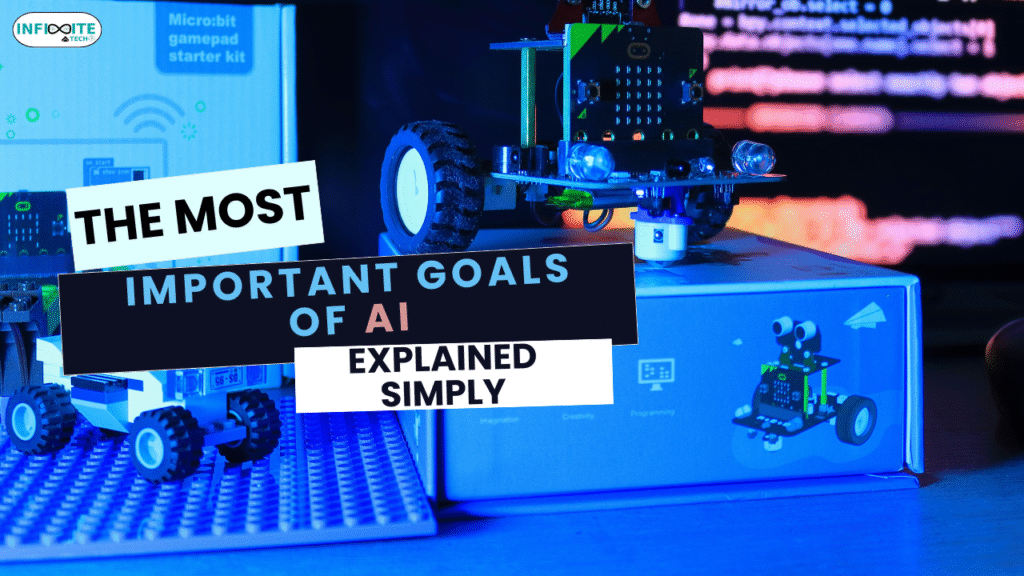
The Most Important Goals of AI Explained Simply
Artificial Intelligence (AI) has become one of the most transformative forces shaping our future. From healthcare breakthroughs to financial automation, AI development is no longer a futuristic idea—it’s here, powering everyday tools and global industries. But what are the most important goals of AI, and why should businesses, governments, startups, and even eco-conscious consumers care? Let’s explore these goals in a simple, approachable way that connects to real-world opportunities.
Why Everyone Is Talking About AI Development
AI is not just about robots or self-driving cars—it’s about creating systems that think, learn, and adapt in ways that make human lives better. Whether you’re a CEO of a large enterprise, an SMB owner, or an educator in EdTech, AI has direct implications for how you operate and grow.
For example:
- In healthcare, AI helps detect diseases faster and with higher accuracy than traditional methods.
- In finance and fintech, AI drives fraud detection and personalized banking experiences.
- In manufacturing and Industry 4.0, predictive maintenance powered by AI reduces downtime and boosts efficiency.
The goals of AI are not abstract—they’re the foundation for productivity, sustainability, and innovation in society.
Surprising Statistics About the Goals of AI
To understand why the goals of AI matter, let’s look at some eye-opening statistics:
- According to PwC, AI could contribute $15.7 trillion to the global economy by 2030—more than the current output of China and India combined.
- A McKinsey report found that 70% of companies worldwide will adopt at least one AI technology by 2030.
- In healthcare, AI is projected to save $150 billion annually in the U.S. alone by reducing unnecessary hospital visits and optimizing care.
- Gartner predicts that by 2027, over 60% of customer service interactions will be handled by AI systems, freeing humans to solve more complex challenges.
These numbers are not just impressive—they show that the goals of AI explained simply can be tied to growth, cost savings, and better experiences across every sector.
The Most Important Goals of AI Explained Simply
So, what are these goals? Let’s break them down into clear, actionable insights.
- Automation of Routine Tasks
AI aims to handle repetitive, time-consuming tasks so humans can focus on creativity, strategy, and problem-solving.
- Example: In retail and e-commerce, chatbots answer customer queries instantly.
- Example: In finance, AI automatically processes loan applications.
- Enhancing Human Decision-Making
AI supports—not replaces—human intelligence by offering data-driven insights.
- In healthcare, AI recommends treatment plans using vast medical databases.
- In government/public sector, AI helps predict traffic flow and reduce congestion.
- Personalization
The goal of AI is to make interactions more meaningful and personalized.
- Streaming platforms like Netflix use AI to recommend movies tailored to your preferences.
- In EdTech, AI provides adaptive learning paths for each student.
- Efficiency and Productivity
AI increases efficiency by predicting issues before they occur.
- In manufacturing, AI detects machine failures before breakdowns.
- In supply chains, AI optimizes delivery routes to reduce costs.
- Sustainability and Eco-Conscious Growth
One of the newer but critical goals of AI is addressing climate change and environmental concerns.
- AI predicts energy demand, helping power companies reduce waste.
- Startups are using AI to design eco-friendly packaging and reduce carbon footprints.
- Safety and Risk Management
AI enhances safety by identifying risks humans may overlook.
- Self-driving cars use AI to avoid accidents.
- In finance, AI spots fraudulent activities faster than humans.
- Innovation in Products and Services
AI development fosters entirely new industries.
- From voice assistants to AI-generated art, these innovations wouldn’t exist without AI.
- In startups, AI is often the core product driving disruption.
How to Transition to Using the Goals of AI in Society
Understanding the goals of AI is one thing—applying them is another. Here’s a step-by-step guide for businesses, governments, and individuals:
Step 1: Identify Areas of Impact
- Large enterprises → Focus on automation in supply chains and customer experience.
- SMBs → Adopt AI-powered CRM tools or chatbots for efficiency.
- Governments → Implement AI in public transport and citizen services.
- Healthcare → Explore AI for diagnostics and patient data management.
- Education → Use adaptive AI tools for personalized learning.
Step 2: Start Small with AI Development
Instead of deploying massive AI projects, begin with pilot programs—like predictive analytics for sales or AI chatbots for support.
Step 3: Upskill Your Workforce
AI development requires both technical and non-technical skills. Invest in training programs to ensure your team knows how to leverage AI.
Step 4: Partner with AI Companies
Collaborate with established AI providers like OpenAI
Step 5: Monitor, Measure, and Improve
Regularly evaluate AI performance and refine models to ensure they align with your goals.
Examples of AI Goals in Action
- Retail & E-commerce → Amazon’s recommendation system drives 35% of sales through AI personalization.
- Finance & Fintech → AI-enabled fraud detection reduces false positives by 60%.
- Manufacturing → General Electric uses AI for predictive maintenance, saving billions annually.
- Healthcare → AI models like Google’s DeepMind detect over 50 eye diseases with expert-level accuracy.
The Broader Social Impact of AI Development
The goals of AI are not just about profit—they’re about societal transformation.
- Education/EdTech → AI provides equal learning opportunities globally.
- Eco-conscious consumers → AI-driven smart homes reduce energy bills while cutting emissions.
- Public sector → AI helps governments make data-driven policies for better citizen welfare.
By embracing the goals of AI, society as a whole moves closer to smarter cities, better healthcare, sustainable industries, and empowered citizens.
Conclusion: Why the Goals of AI Matter to You
To recap:
- The goals of AI explained simply revolve around automation, decision-making, personalization, efficiency, sustainability, safety, and innovation.
- AI development is shaping industries from healthcare and finance to manufacturing and education.
- Transitioning to AI requires identifying impact areas, starting small, upskilling, and collaborating with AI providers.

